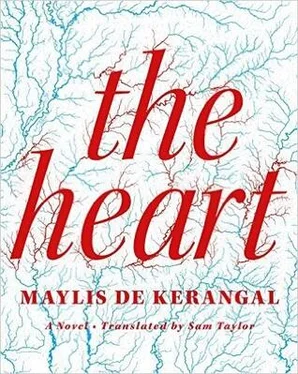Maylis de Kerangal - The Heart
Здесь есть возможность читать онлайн «Maylis de Kerangal - The Heart» весь текст электронной книги совершенно бесплатно (целиком полную версию без сокращений). В некоторых случаях можно слушать аудио, скачать через торрент в формате fb2 и присутствует краткое содержание. Год выпуска: 2016, ISBN: 2016, Издательство: Farrar, Straus and Giroux, Жанр: Современная проза, на английском языке. Описание произведения, (предисловие) а так же отзывы посетителей доступны на портале библиотеки ЛибКат.
- Название:The Heart
- Автор:
- Издательство:Farrar, Straus and Giroux
- Жанр:
- Год:2016
- ISBN:9780374713287
- Рейтинг книги:5 / 5. Голосов: 1
-
Избранное:Добавить в избранное
- Отзывы:
-
Ваша оценка:
- 100
- 1
- 2
- 3
- 4
- 5
The Heart: краткое содержание, описание и аннотация
Предлагаем к чтению аннотацию, описание, краткое содержание или предисловие (зависит от того, что написал сам автор книги «The Heart»). Если вы не нашли необходимую информацию о книге — напишите в комментариях, мы постараемся отыскать её.
The Heart
The Heart
The Heart — читать онлайн бесплатно полную книгу (весь текст) целиком
Ниже представлен текст книги, разбитый по страницам. Система сохранения места последней прочитанной страницы, позволяет с удобством читать онлайн бесплатно книгу «The Heart», без необходимости каждый раз заново искать на чём Вы остановились. Поставьте закладку, и сможете в любой момент перейти на страницу, на которой закончили чтение.
Интервал:
Закладка:
Your son is in critical condition.
* * *
Hearing those first words — limpid tone, calm tempo — Marianne’s eyes, which are still dry, rest on Révol’s, which hold her gaze, while he begins his next sentence and she composes herself. His words are crystal clear without being brutal — his semantics correct and precise, largos woven into the silences, pauses that closely fit the deployment of meaning — and spoken slowly enough that Marianne can repeat each syllable she hears internally, engrave them in her memory: Your son suffered a cranial trauma in the accident. The scanner shows a major injury in the frontal lobe — he touches his hand to his skull, to the side of his forehead, to illustrate what he means — and this violent shock provoked a cerebral hemorrhage. Simon was in a coma when he arrived at the hospital.
Révol takes a sip of his now-lukewarm coffee. Across from him, Marianne has turned to stone. The telephone rings — one, two, three times — but Révol does not pick it up. Marianne stares into his face, absorbing it whole: silky-white complexion, mauve rings under transparent gray eye bags, heavy lids wrinkled like walnut shells, a long and mobile face — and the silence swells, until Révol speaks again: I’m worried — the sudden, inexplicable loudness of his voice surprises her, as if someone has nudged the volume control — we are carrying out examinations at the moment, and the first results are not good. Even though his voice makes an unknown sound in Marianne’s ears, and instantly accelerates her breathing, it is not enveloping, it does not sound like those horrific voices that purport to comfort while leading you to a mass grave; on the contrary, his voice designates a place for Marianne, a place and a line.
He is in a deep coma.
* * *
The seconds that follow open up a space between them, a naked and silent space. They wait on the edge of this space for what seems a long time. Marianne Limbres begins to turn the word “coma” slowly in her head while Révol once again approaches the darkest part of his profession. Still rolling the paperweight in the palm of his hand — a veiled and solitary sun — he thinks that there is nothing as violent, as complex as this: placing himself next to this woman so that they can, together, penetrate that fragile zone of language where death is declared, so that they can move forward, in synchrony. He says: Simon is not reacting to painful stimuli anymore. His eyes are nonreactive and he is in a vegetative state; with regard to his breathing, we are beginning to see fluid accumulating in his lungs, and the first scans are not good. He speaks slowly, his phrases punctuated by intakes of breath: a way of making his body, himself, present in his words, a way of adding empathy to this clinical sentence. He speaks as if carving the words into stone, and now the two of them are face-to-face, confronting the truth — this is it, the ultimate face-to-face — and it has been accomplished unswervingly, as if speaking and looking were two sides of the same coin, as if they had to face each other as much as they will have to face up to what awaits in one of the rooms of this hospital.
* * *
I want to see Simon — voice distraught, eyes and hands wandering. I want to see Simon — that is all she had said, when her cell phone rang for the umpteenth time from the depths of her coat pocket: the neighbor who’s looking after Lou, Chris’s parents, Johan’s parents, but still no word from Sean. Where is he? She sends a text: Call me.
* * *
Révol looked up. Now? You want to see him now? He glances at his watch—12:30—and replies, calmly, I’m afraid it’s impossible at the moment. You’ll have to wait a while: he’s in treatment right now, but as soon as we’ve finished, you will of course be able to see your son. And, placing a yellowish sheet of paper between them, he continues: If it’s all right with you, we need to talk about Simon. Talk about Simon. Marianne tenses. What does he mean, “talk about Simon”? Are they going to fill out one of those forms like they often do in hospitals? List the operations he’s had? — adenoids, appendix, nothing else — the bones he’s broken? — a radius fractured in a bicycle accident the summer he turned ten, that’s all — any allergies? — no, none — diseases he’s contracted in the past? — that staph infection the summer he turned five, which he told everyone about because that fabulous name ( Staphylococcus aureus ) made it seem so rare; the mononucleosis he suffered at sixteen, the kissing disease, the lovers’ disease, and his lopsided smile when teased about it, the strange pajamas he wore then, like a pair of Hawaiian bermudas matched with a quilted sweatshirt. Are they going to list his childhood illnesses? Talk about Simon. The images speed through her mind and Marianne panics: a baby with roseola lying on a garter-stitch baby blanket; a three-year-old boy with measles, brown scabs on his scalp, behind his ears, and that fever that dehydrated him, turning the whites of his eyes yellow and his hair sticky for ten long days. Marianne speaks tersely while Révol takes notes — date and place of birth, weight, height — and seems in fact not really to care about those childhood illnesses once he has written on his form that Simon has no particular background of serious diseases, rare allergies, or malformations of which his mother is aware. At these words, Marianne becomes flustered, a memory flash, ten-year-old Simon on a school ski trip, afflicted with violent stomach pains, and the doctor who examined him palpating his left side and, assuming it was appendicitis, diagnosing an “inverted anatomy,” the heart on the right side, not the left, etc., a statement that no one questioned, and that fantastical anomaly had turned him into a special person for the rest of that ski trip.
Thank you, Mme Limbres. Then, after smoothing the sheet down with the flat of his hand, he returns it to Simon’s dossier, a pale-green folder. He looks back up at Marianne: You can see your son as soon as we have completed the examinations. What examinations? Marianne’s voice sounding suddenly alert in the office, and the vague idea that if they are conducting examinations, then all is not lost. The glimmer in her eyes warns Révol, who makes an effort to bring the situation under control, stemming the tide of hope: Simon’s situation is developing, but not in the way we would want it to. Marianne’s face registers the pain of this blow. Ah, she says, so how is Simon’s condition developing exactly? In speaking like this, she knows she is leaving herself open to another blow, that she is taking a risk. Révol inhales deeply before replying.
Simon’s injuries are irreversible.
* * *
He has the unpleasant sensation of having kicked this woman when she was down, of having delivered a death blow. He stands up. We’ll call you as soon as we can. Then, in a louder voice, Does Simon’s father know? Marianne stares at him and answers he’ll be here this afternoon — but Sean still hasn’t called or texted, and suddenly she is seized with panic, begins wondering if maybe he isn’t in the warehouse today, or at home, if maybe he’s gone to Villequier or Duclair or Caudebec-en-Caux to deliver a skiff, or if he’s at the rowing club on the Seine, in fact maybe at this very moment he’s trying out the boat with the buyer, and they’re rowing, sitting on the sliding seat, Sean watching and quietly making remarks, impressing with his expert terminology, and little by little Marianne sees the river narrowing between high, mossy rock walls covered with plants growing out horizontally, giant ferns and fleshy vines, peat moss and acid-green grass all tangled up along the vertical cliffs or bowing toward the river in leafy cascades, then the light dims, the geography leaving only a narrow corridor of milk-white sky above the boat, the water becoming heavy, flat, slow, the surface aswarm with insects — iridescent-turquoise dragonflies, transparent mosquitoes — the river turning bronze, scattered with silver reflections, and suddenly, in horror, Marianne imagines that Sean has returned to New Zealand, that he is rowing up the Whanganui River, from the Cook Strait, leaving from another estuary and another city, and heading inland, alone in his canoe, fully at peace, the way she had known him, gazing straight ahead; he rowed steadily, passing Maori villages along the riverbank, climbing down the waterfalls, carrying the light boat on his back, advancing ever northward, toward the central plateau and the Tongariro volcano, where the sacred river drew its source, retracing the path of migration to the new lands. She can see Sean precisely, she can even hear his breath echoing in the canyon. Everything is calm there, suffocatingly calm. Révol watches her, concerned by the panic he can see in her eyes, but when he says I’ll see you with him, then, when he arrives, Marianne nods, okay.
Читать дальшеИнтервал:
Закладка:
Похожие книги на «The Heart»
Представляем Вашему вниманию похожие книги на «The Heart» списком для выбора. Мы отобрали схожую по названию и смыслу литературу в надежде предоставить читателям больше вариантов отыскать новые, интересные, ещё непрочитанные произведения.
Обсуждение, отзывы о книге «The Heart» и просто собственные мнения читателей. Оставьте ваши комментарии, напишите, что Вы думаете о произведении, его смысле или главных героях. Укажите что конкретно понравилось, а что нет, и почему Вы так считаете.












